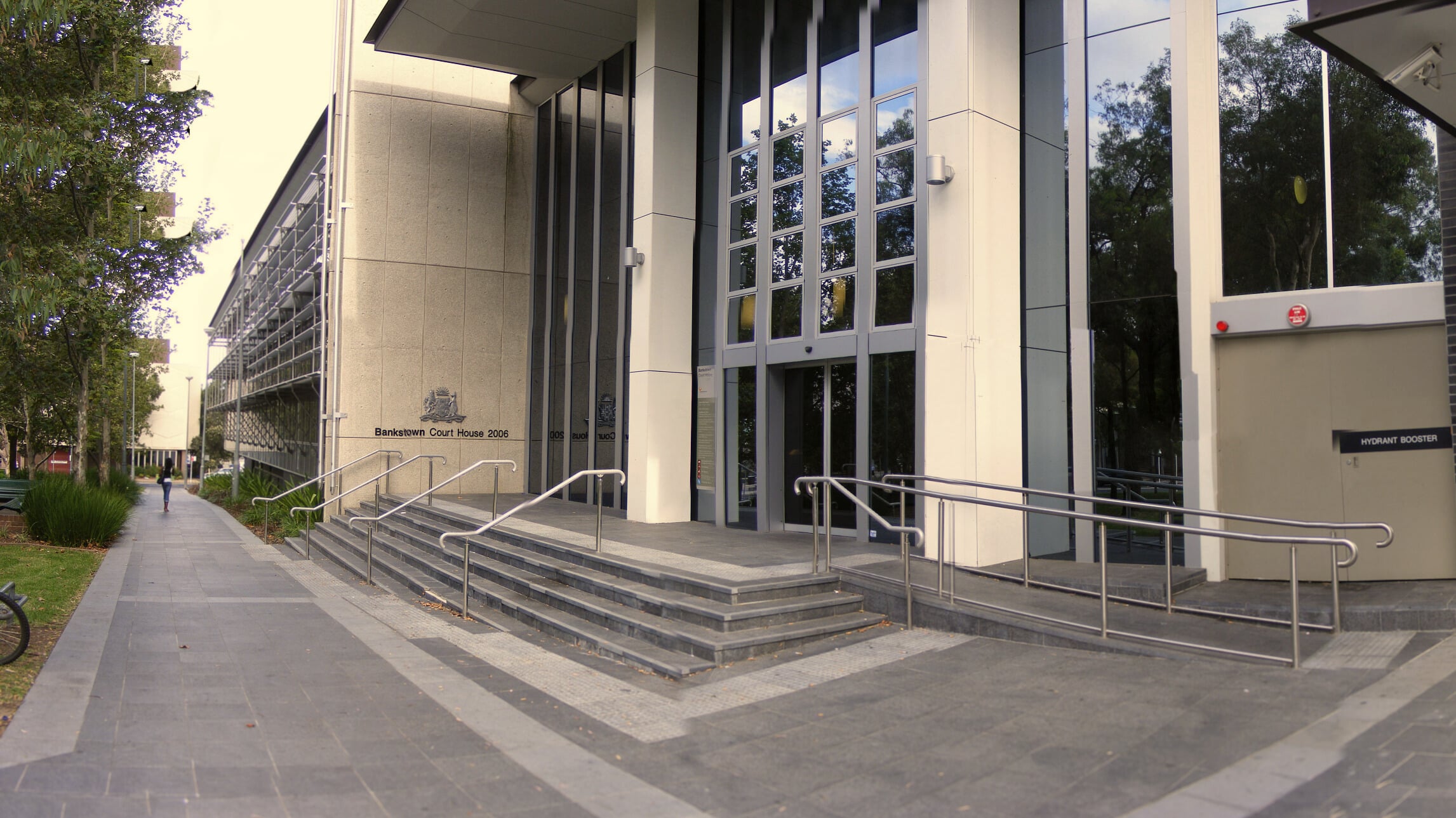Navigating the legal system can be daunting, especially when facing a court appearance. At Jameson Law, we understand the importance of being well-prepared and informed.
This comprehensive guide to Bankstown Local Court aims to demystify the process and provide you with essential information. From location details to court procedures, we’ll cover everything you need to know to approach your court matter with confidence.
Where Is Bankstown Local Court
Location and Accessibility
Bankstown Local Court is located at the corner of Chapel Road and The Mall, Bankstown, NSW 2200. This central location puts the courthouse within easy reach of local amenities and public transport options.
Contact Information
You can reach the court at 1300 679 272. The postal address is PO Box 71 Bankstown NSW 2200. The court operates Monday to Friday from 9:30 AM to 4:30 PM. It’s advisable to call ahead for specific questions about your case or court procedures.
Public Transport Options
The courthouse is a 10-minute walk from Bankstown train station (served by the T3 Bankstown Line). Several bus routes (including the 900, 913, and 914) stop near the court, providing additional public transport options.
Parking Facilities
Parking near the courthouse can be challenging. Limited street parking fills up quickly, especially on busy court days. The Bankstown Central Shopping Centre car park on North Terrace (a 5-minute walk from the court) offers all-day parking options.
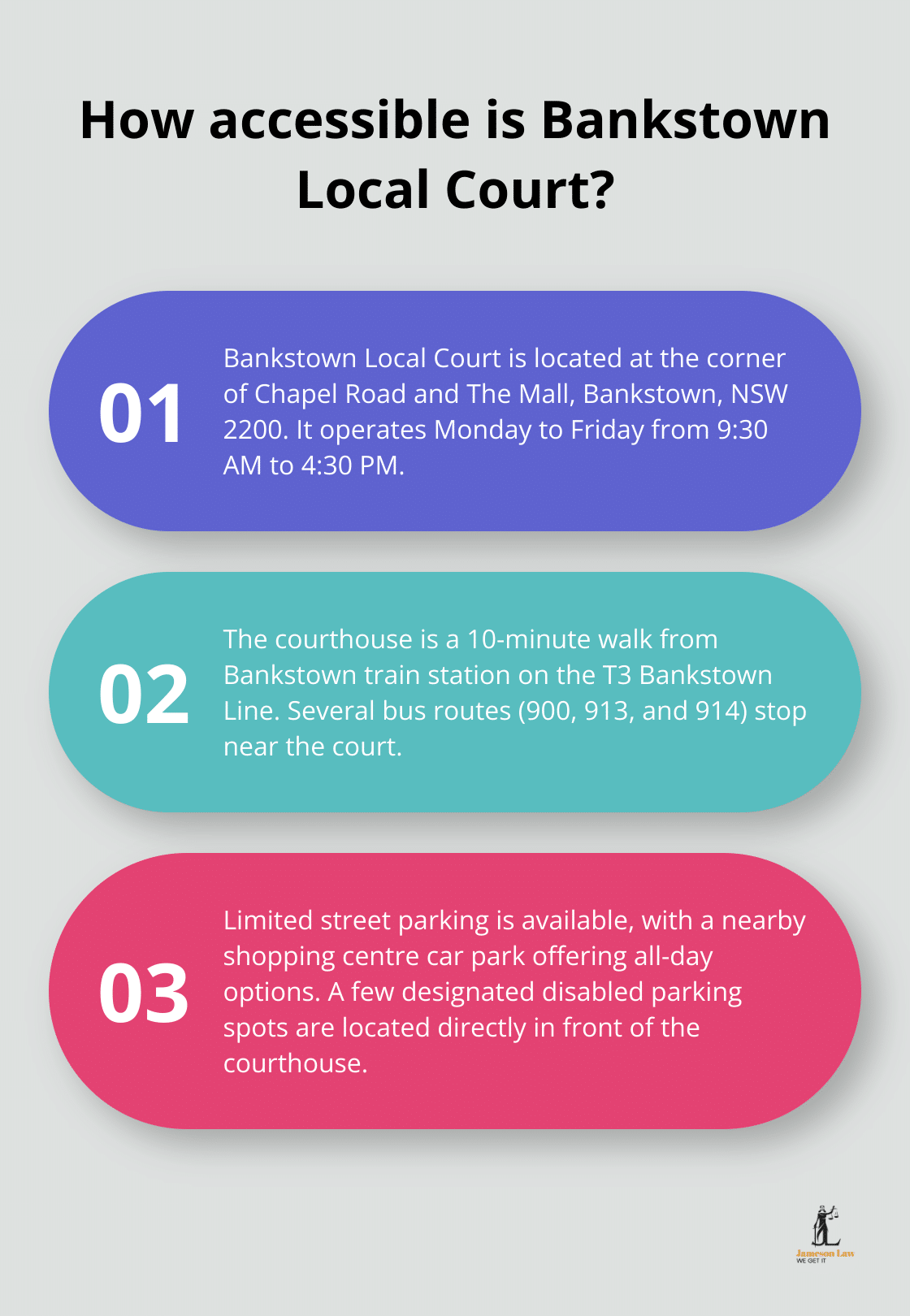
A few designated disabled parking spots are available directly in front of the courthouse. However, these spots are limited, so early arrival is recommended if you need to use them.
Arrival Time and Security
Punctuality is essential when attending court. You should aim to arrive at least 30 minutes before your scheduled appearance time. This extra time allows for unexpected delays and gives you time to pass through security and locate the correct courtroom.
Familiarising yourself with the location and planning your journey in advance can help reduce stress and ensure you’re well-prepared for your court appearance at Bankstown Local Court. The next section will cover the types of cases heard at this courthouse and the necessary documentation you’ll need to bring.
What Cases Does Bankstown Local Court Handle?
Criminal Matters
Bankstown Local Court handles a wide range of criminal cases. These include traffic offences, drug possession, assault, theft, and property damage. For more serious crimes, the court conducts committal hearings to determine if there’s enough evidence to send the case to a higher court.
Civil Disputes
The court also addresses civil disputes up to $100,000. These can include small claims, debt recovery, and consumer complaints. Disputes exceeding this amount are typically referred to the District Court.
Family and Personal Safety
Apprehended Violence Orders (AVOs) are frequently heard at Bankstown Local Court. These orders protect individuals from domestic violence, stalking, or harassment. The court also manages some family law matters, particularly those related to child support and protection.
Filing Procedures and Documentation
Filing procedures differ based on the case type. For criminal matters, the police typically file charges. In civil cases, the plaintiff must file a statement of claim. For AVOs, individuals can apply directly at the court or through the police.
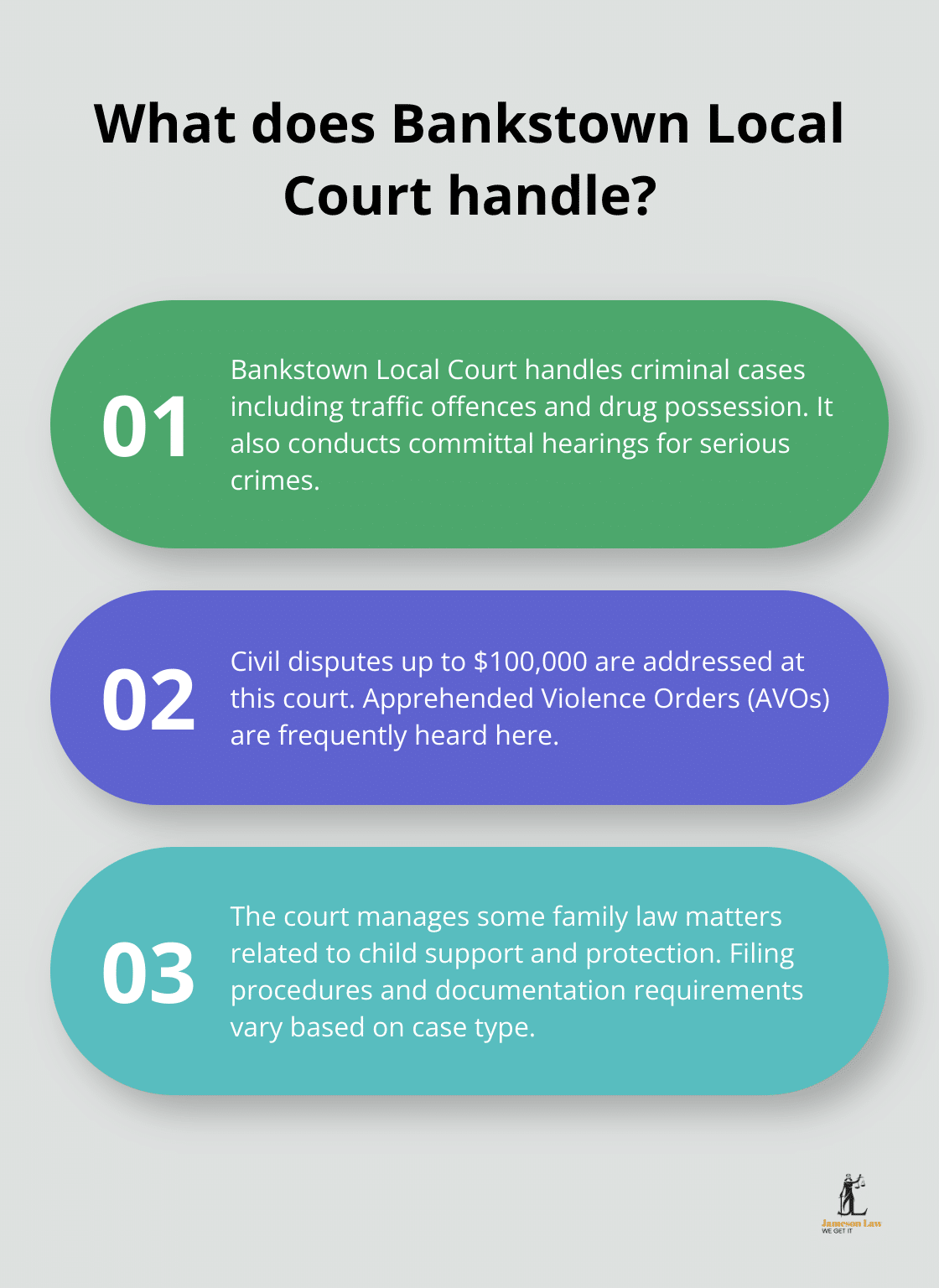
Documentation requirements are specific to each case type. You’ll need to bring identification, any relevant police or medical reports, and evidence supporting your case. For civil matters, contracts, receipts, or correspondence related to the dispute are essential.
Court Fees and Payment Methods
Court fees apply to most matters, with amounts varying based on the case type and your financial situation. Fee waivers are available for those experiencing financial hardship.
Payment methods include EFTPOS, credit card, cash, or bank cheque. Online payment options are also available for certain fees through the NSW Online Registry.
Interpreting Services and Accessibility
Bankstown Local Court provides interpreting services for non-English speakers. If you require an interpreter, notify the court at least two weeks before your hearing date. This service is free for criminal matters and AVOs.
The court offers accessibility features for people with disabilities. These include wheelchair access, hearing loops for the hearing impaired, and permission for assistance animals in the courthouse.
The next section will guide you through preparing for your court appearance, including what to bring, dress code, and understanding court proceedings.
How to Prepare for Your Bankstown Local Court Appearance
Essential Items to Bring
On your court day, you must bring all relevant documents. This includes your court summons, evidence supporting your case, and identification (such as a driver’s license or passport). For traffic offenses, bring your driver’s license. Civil matters require copies of contracts, receipts, or correspondence related to the dispute.
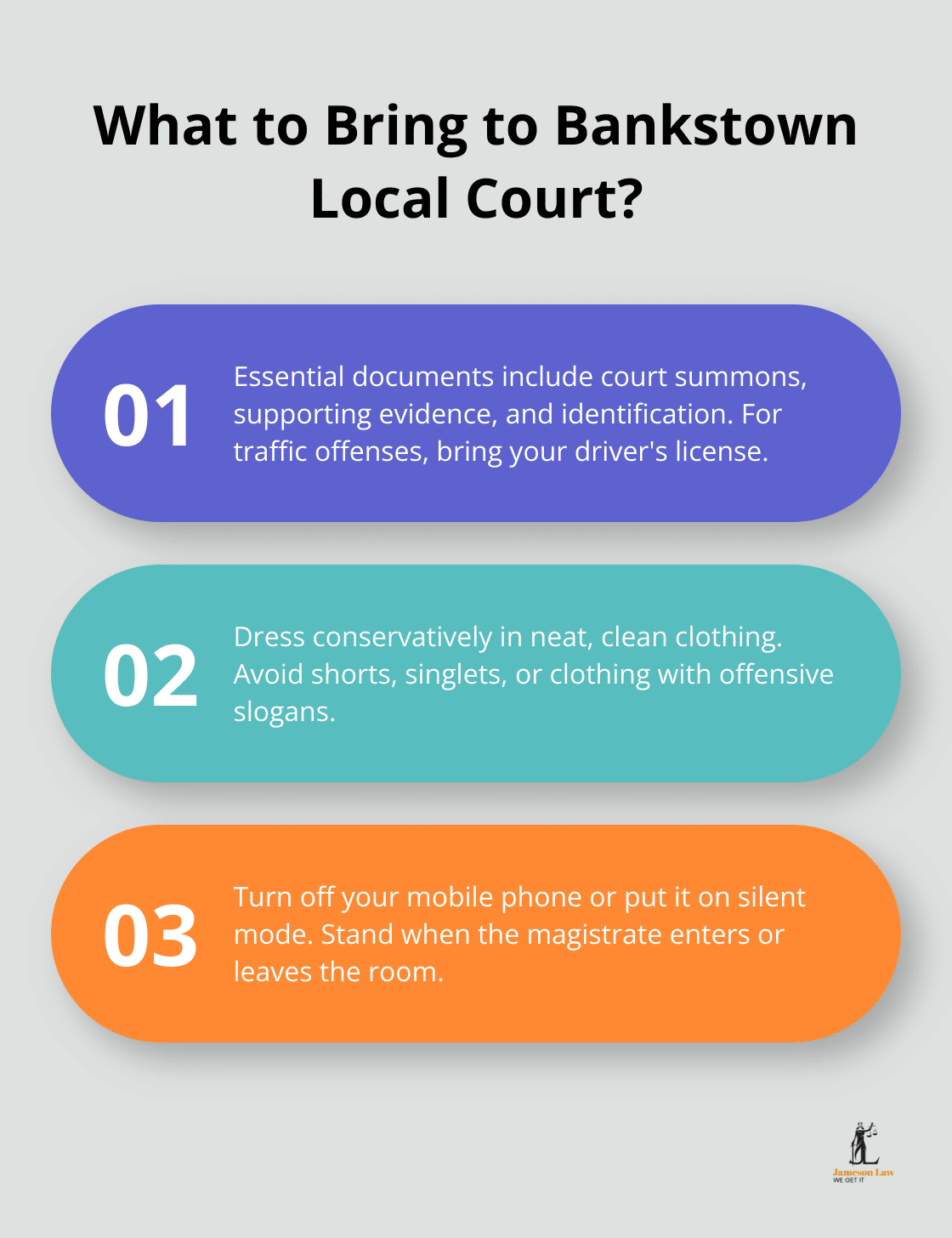
Don’t forget a pen and notepad to record important information during proceedings. If you take medication, bring it with you (court sessions can sometimes run longer than expected).
Dress Code and Courtroom Etiquette
You should dress conservatively for court. While a suit isn’t mandatory, try to wear neat, clean clothing that shows respect for the court. Avoid shorts, singlets, or clothing with offensive slogans.
In the courtroom, turn off your mobile phone or put it on silent mode. Stand when the magistrate enters or leaves the room, and when you address the court. Always address the magistrate as “Your Honour.”
Speak clearly and calmly when it’s your turn to speak. Don’t interrupt others, including the magistrate or opposing counsel. If you don’t understand something, politely ask for clarification.
Understanding Court Proceedings
Court proceedings can be complex. When your case is called, move to the bar table. The prosecutor or plaintiff presents their case first, followed by the defendant. Each side may call witnesses and present evidence.
The magistrate may ask questions throughout the proceedings. Answer honestly and directly. If you don’t know an answer, it’s okay to say so.
After hearing all evidence, the magistrate will make a decision. This might happen immediately or be reserved for a later date.
Legal Representation Options
While you can represent yourself, having a lawyer can significantly improve your chances of a favourable outcome. Lawyers understand court procedures and can navigate complex legal issues effectively.
If you can’t afford a private lawyer, you may be eligible for legal aid. The Legal Aid NSW website provides information on how to submit an application for legal aid, including tips for filling out your form. Alternatively, community legal centres offer free or low-cost legal advice.
Jameson Law (with over 40 years of combined experience) offers expert representation across various legal areas. Their team’s extensive experience with Bankstown Local Court procedures can be invaluable in preparing and presenting your case effectively.
Final Thoughts
The Bankstown Local Court system presents complex challenges for those unfamiliar with legal proceedings. Proper preparation, including early arrival, appropriate attire, and necessary documentation, can significantly impact your court experience. Understanding court procedures and etiquette will help you approach your appearance with confidence, regardless of the case type.
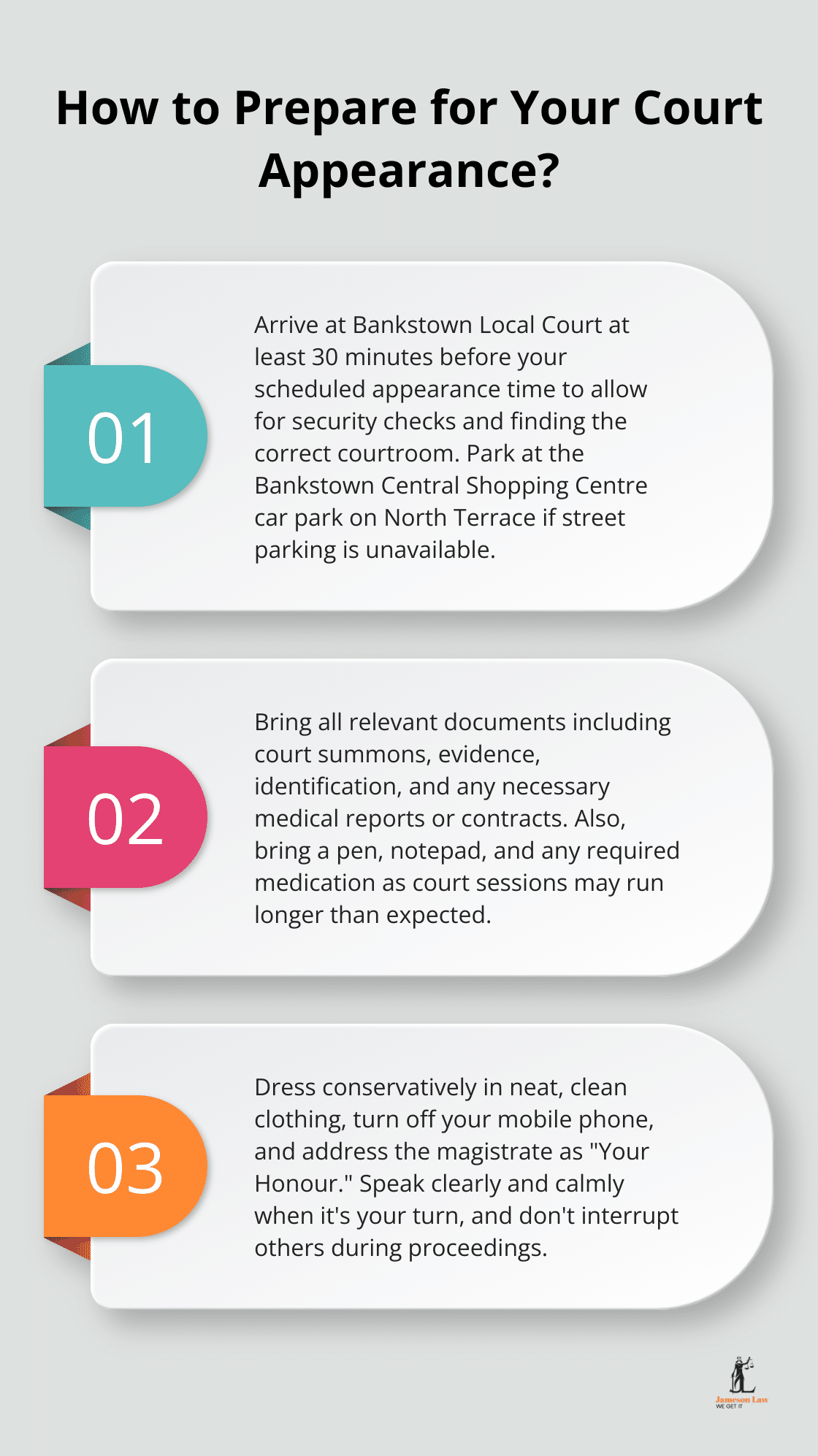
Professional legal guidance often proves beneficial when navigating the intricacies of court proceedings. Jameson Law offers expert legal services for matters handled at Bankstown Local Court, with a team experienced in local procedures. Our lawyers strive to achieve the best outcomes for clients across various legal areas.
Court appearances can cause stress, but you don’t need to face them alone. Thorough preparation and professional legal support can provide clarity and confidence as you approach your Bankstown Local Court matter. Our team at Jameson Law stands ready to assist you through your legal challenges.



